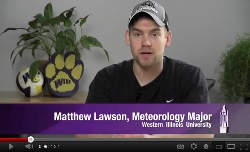Web Accessibility Committee Works to Provide Resources for Campus
May 7, 2012

Matthew Lawson, a Western Illinois University freshman majoring in meteorology and a student member of WIU's Web Accessibility Committee, recently talked about his struggle with reading inaccessible documents in a video produced by the committee.
[Download Print-Quality Image]
MACOMB, IL – Matthew Lawson, a Western Illinois University freshman majoring in meteorology, has been logging lots of reading time for his final exams this week. While this activity is not atypical this time of year for any college student, the time it takes Lawson—who has impaired vision—to read the textbooks and documents assigned by his instructors is likely considerably more than that of his fellow students.
According to Lawson, to help him with this reading assignments and studies he uses such tools as the screen-reading software JAWS. But, he noted, the software only goes so far. As a student member of WIU's Web Accessibility Committee, Lawson recently talked about his struggle with reading inaccessible documents in a video produced by the committee. It was shown at the WIU Disability Resource Center's "Celebrating Disability Culture Day" event in late March.
Matthew Lawson, a Western Illinois University freshman majoring
in meteorology and a student member of WIU's Web Accessibility
Committee, recently talked about his struggle with reading
inaccessible documents in a video produced by the committee.
"My vision impairment is called 'leber's hereditary optic neuropathy,' and it started when I was 15. Because of it, I cannot see distance and I cannot read fine print. One of the tools I use for reading is called 'JAWS,' which is screen-reading software that reads text appearing on my computer screen," Lawson explained. "One of the most important ways instructors can help is to provide their reading assignments in Microsoft Word files or in PDF files that have been made accessible. If they haven't made the PDFs accessible, if they could create their reading assignments in Word documents that would help me out big time, because there is so much to read, and JAWS seems to work better with Word documents or PDFs that are accessible," he added.
WIU instructors in search of resources that will help them learn how to make their documents and web content accessible for students like Lawson can look to the Web Accessibility Committee's website at www.wiu.edu/accessibility. According to Richard Chamberlain, co-chair of the Web Accessibility Committee and University Technology user support executive director, the group collects resources intended to help WIU personnel understand web accessibility issues and make their digital content and websites accessible, as now required by Illinois law via the Illinois Information Technology Accessibility Act (IITAA).
"The Web Accessibility Committee's primary focus is to ensure that the University's web content is presented in an accessible format. We also assist in providing both faculty and staff with resources to assist in the development of accessible materials. We have been working campus-wide supporting captioning video for the web, have provided training sessions on how to create accessible Word documents, and have generally tried to raise awareness of the need to create accessible materials. Our website provides some quick links to resources on how to make accessible Word and PDF documents, best practices for video captioning and the ability to make a request for video captioning help from our Captioning Pool," he said.
For more information about the Web Accessibility Committee, contact Chamberlain at (309) 298-4500 or RE-Chamberlain@wiu.edu or Andrea Henderson, director of equal opportunity and access and Web Accessibility co-chair, at (309) 298-1977 or AD-Henderson@wiu.edu.
Posted By: University Communications (U-Communications@wiu.edu)
Office of University Communications & Marketing

Connect with us: